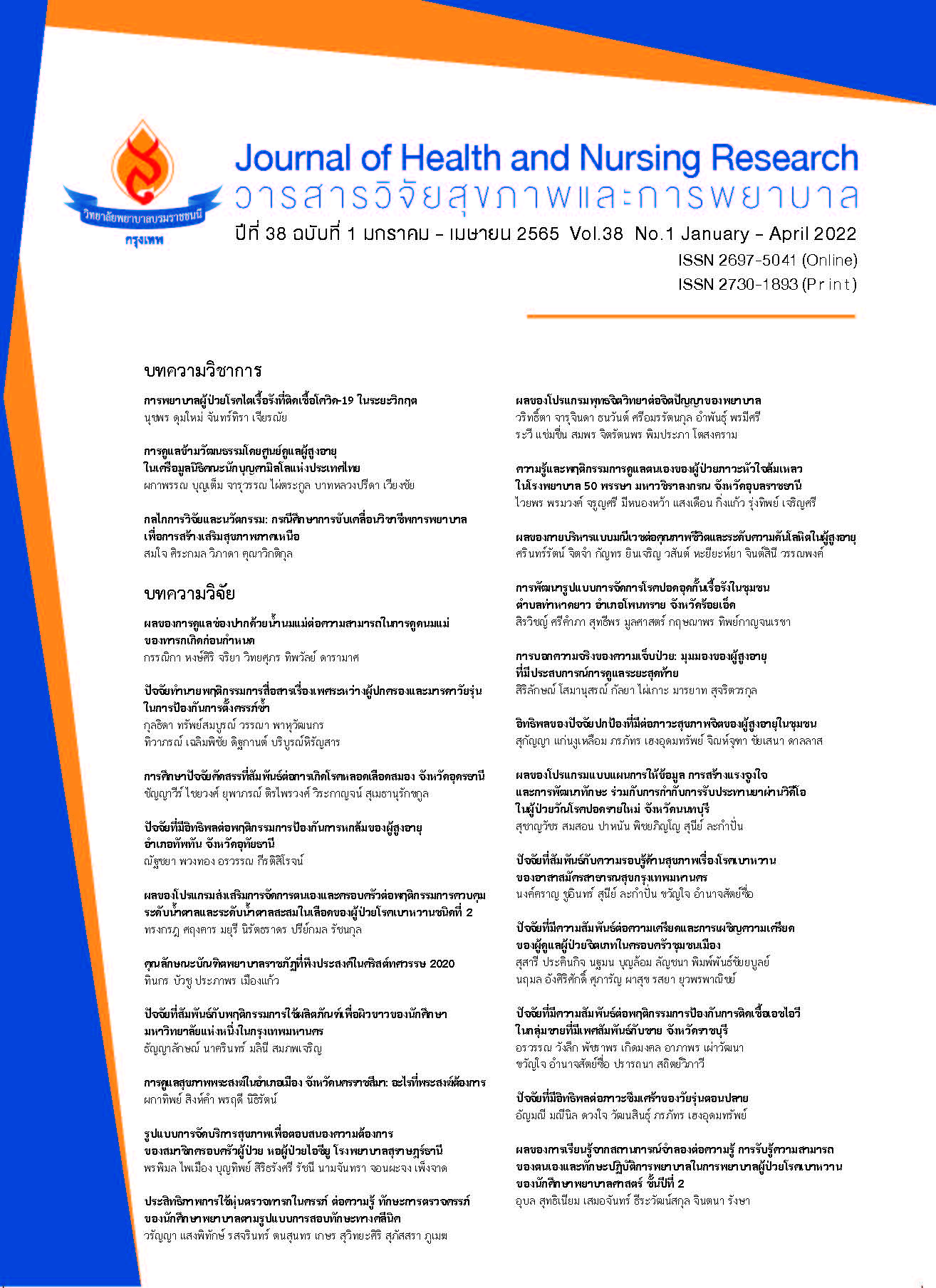การบอกความจริงของความเจ็บป่วย: มุมมองของผู้สูงอายุ ที่มีประสบการณ์การดูแลระยะสุดท้าย
คำสำคัญ:
การบอกความจริง , ผู้สูงอายุ, ระยะสุดท้ายของชีวิต , การวิจัยเชิงคุณภาพบทคัดย่อ
บทคัดย่อ
บทนำ: การบอกความจริงของความเจ็บป่วย มีความสำคัญสำหรับบุคคลากรและผู้ป่วยที่อยู่ในระยะสุดท้ายของชีวิต
วัตถุประสงค์การวิจัย: เพื่ออธิบายความหมายและความต้องการเกี่ยวกับการบอกความจริงของความเจ็บป่วยตามมุมมองของผู้สูงอายุที่มีประสบการณ์การดูแลระยะสุดท้าย
ระเบียบวิธีวิจัย: การศึกษาครั้งนี้ เป็นการวิจัยเชิงคุณภาพ ผู้ให้ข้อมูลเป็นผู้สูงอายุ จำนวน 15 ราย ที่ได้จากการเลือกแบบเจาะจงและแบบลูกโซ่ เก็บข้อมูลโดยการสัมภาษณ์เชิงลึก วิเคราะห์ข้อมูลเชิงเนื้อหา
ผลการวิจัย: ความหมายของการบอกความจริงของความเจ็บป่วย มี 3 ประเด็น คือ 1) การบอกข้อมูลโดยไม่ปิดบัง 2) การให้ข้อมูลที่ช่วยให้ผู้ป่วยได้เตรียมตัว และ 3) การบอกสิ่งที่บั่นทอนจิตใจ แต่ต้องยอมรับ เกี่ยวกับความต้องการต่อการบอกความจริงของความเจ็บป่วย พบว่า ผู้ให้ข้อมูลส่วนใหญ่ต้องการให้บอกความจริงของความเจ็บป่วย ด้วย 2 เหตุผล คือ 1) การได้ทำใจยอมรับ และ 2) การได้วางแผนชีวิต ทำสิ่งที่อยากทำ โดยลักษณะของการบอกความจริงที่ต้องการ ได้แก่ 1) การบอกด้วยความเข้าใจและให้กำลังใจ 2) การคำนึงถึงสภาพของผู้ป่วยเป็นสำคัญ 3) การพูดบอกแบบตรงๆ 4) การบอกแบบอ้อมๆ ค่อยๆ บอก 5) การบอกความจริงกับบุคคลที่พร้อม และ 6) การบอกให้ทราบเป็นระยะไม่ควรบอกแค่ช่วงท้าย และมีผู้ให้ข้อมูลบางส่วนที่ไม่ต้องการให้บอกความจริงของความเจ็บป่วย ด้วยเหตุผล 1) กลัวความจริงที่จะรู้ และ 2) รู้แล้วเกิดความทุกข์
สรุปผล: การบอกความจริงของความเจ็บป่วยให้กับผู้สูงอายุที่อยู่ในระยะสุดท้ายเป็นสิ่งที่สำคัญอย่างยิ่ง เพราะเกี่ยวข้องกับการยอมรับและการวางแผนชีวิตในช่วงท้ายของผู้สูงอายุ
ข้อเสนอแนะ: บุคลากรสุขภาพที่เกี่ยวข้องกับการบอกความจริงของความเจ็บป่วยแก่ผู้สูงอายุควรเป็นผู้มีเทคนิคการสื่อสารที่ดี คำนึงที่ความต้องการของผู้สูงอายุเป็นหลักและมีความเข้าใจถึงการเปลี่ยนแปลงของผู้สูงอายุในระยะสุดท้ายทั้งด้านร่างกายและจิตใจ
Downloads
เอกสารอ้างอิง
Sittichanbuncha Y, Paisansuthideth U, Pawinwat S. National forum of palliative care: the harmony of education to service; 2011 Feb 21-23; Bangkok, Thailand. Bangkok: Offset Creation; 2011. (in Thai).
Sanprasarn P, Chaleoykitti S. Ethical judgment in risks of nursing practice among Thai nurses as perceived by nursing administrators. The Royal Thai Army Nurses J 2017; 18(1):194-205. (in Thai).
WHO Regional Office for Europe’s Health Evidence Network. What are the palliative care needs of older people and how might they be met? [internet]. 2004 [cited 2019 March 5]. Available from: http://www.euro.who.int/__data/assets/pdf_file/0006/74688/E83747.pdf Copenhagen: World Health Organization
Getpook C. Truth telling. Songkla Med J 2003; 21(3):223-29. (in Thai).
Elshamy K. Cultural and ethical challenges in providing palliative care for cancer patients at the end of life. Palliative Medicine and Hospice Care 2017; SE(1): S75-84.
Panuthai S, Srirat C, Wonghongkul T. Characteristics of a good death as perceived by related people in the upper northern Thai context. J of Thailand Nursing and Midwifery Council 2020; 35(4):35-53. (in Thai).
Thaipradit S. Role of nurse for advance care plan in critical patient. Nursing J 2017; 44(4):189-194. (in Thai).
Surakul J, Chaowalit A, Phantusena C, Suttharangsee W. Experiences of patients in being told the truth about their illnesses from member of the health team. Songkla Med J 2002; 20(4):241-49. (in Thai).
Wuthiphongpat P. Palliative care according to the religious beliefs and the living will. Veridian E-J, Science and Technology Silapakorn University 2016; 3(6):149-161. (in Thai).
Xue D, Wheeler JL, Abernethy AP. Cultural difference in truth-telling to cancer patients: Chinese and American approaches to the disclosure of bad news. Prog in Palliat Care 2011; 19(3):125-131.
Petpichetchian W. Best nursing practice in cancer care. Songkla: Chanmuang Press; 2011. (in Thai).
Pattniboon W. Pratunon J. Kaewmafai J. Model development of palliative care for elderly with end stage chronic illnesses at medical unit II, Loi Et hospital; 2012. (in Thai).
Rachawat W, Kunsongkeit W, Kangchai W. Caring need and the caring need response of family members of terminal cancer patients. J of Boromarajonani College of Nursing, Bangkok 2019; 35(1): 153-162. (in Thai).
Pungchompoo W, Losawadkul S. Ethical dilemmas and ethical decision making of nurses working in Intensive Care Units. Nursing J 2006; 33(1):177-188. (in Thai).
Phengjard J. Nurse’s role in palliative care. J of Boromarajonani College of Nursing, Bangkok 2014; 30(1): 100-109. (in Thai).
Somanusorn S, Hattkit U, Nilmanat K. Caring for a relative at the end of life to die peacefully in the Thai buddhist culture. J of Faculty of Nursing Burapha University 2011; 9(2):28-41. (in Thai).
Shaw S. Exploring the concepts behind truth-telling in palliative care. Int J of Palliat Nurs 2008; 14(7):356-59.
Thongcharoen V, Viripiromgool S, Praditsuwan R, Peachpansri S, Sukkapathanasrikul S. Palliative and end of life care model for older adults. J Pub Health Dev. 2017; 15 (Suppl.1):S38-59. (in Thai).
Phothisita C. The art and science of qualitative research, 3rd ed. Bangkok: Amarin printing & publishing; 2007. (in Thai).
Miller CA. Nursing for wellness in older adults, 5thed. Philadelphia: Wolters Kluwer/ Lippincott Williams & Wilkins; 2009.
Pongsiri C. Experience of caring for terminal patients for a good death: case study. Thai Red Cross Nursing J 2018; 11(2):1-14. (in Thai).
Tongprateep T. Spirituality: a dimension of nursing. Bangkok: Chulalongkorn University printing; 2009. (in Thai).
Pancharoen C. Plubrukarn R. Thisayakorn U. editors. Communication skills: principle of effective communication. Bangkok: Pediatric society of Thailand; 2007. (in Thai).
ดาวน์โหลด
เผยแพร่แล้ว
รูปแบบการอ้างอิง
ฉบับ
ประเภทบทความ
สัญญาอนุญาต
ลิขสิทธิ์ (c) 2022 วารสารวิจัยสุขภาพและการพยาบาล (วารสารวิทยาลัยพยาบาลบรมราชชนนี กรุงเทพ)

อนุญาตภายใต้เงื่อนไข Creative Commons Attribution-NonCommercial 4.0 International License.
บทความที่ได้รับการตีพิมพ์ เป็นลิขสิทธิ์ของวารสารวิจัยสุขภาพและการพยาบาล (วิทยาลัยพยาบาลบรมราชชนนี กรุงเทพ) ไม่สามารถนำไปตีพิมพ์ซ้ำในวารสารฉบับอื่น


















